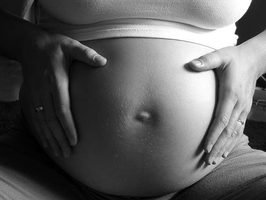Bacterial vaginosis in pregnancy
When symptoms are present they may include increased thin and runny vaginal discharge, which may be offensive or fishy smelling in odour particularly after sexual intercourse or during menstrual discharge.
During pregnancy, the volume of vaginal discharge increases anyway and may be confused with the diagnosis of BV.

Complications of bacterial vaginosis in pregnancy
Research studies in the last 20 – 30 years have shown that women who have BV in pregnancy are at increased risk of complications during pregnancy, childbirth and afterwards. These complications include;
- miscarriage, particularly late miscarriage(1) (i.e. after 16 weeks of pregnancy)
- rupture of membranes
- preterm births – with breathing problems
- infection of the placenta and membranes (the baby’s afterbirth)
- low birth weight babies (small babies)
- neonatal sepsis
- cerebral palsy
- endometritis (infection of the womb after delivery)
- wound infection
Treatment of bacterial vaginosis in pregnancy
Pregnant women who suffer from symptoms of bacterial vaginosis should be treated to relieve their symptoms. At the present time opinion is divided on whether all pregnant women should be screened for BV and treated if they are found to have it to reduce the risk of complications in pregnancy. Our own research showed that such screening and treatment reduced the risk of late miscarriage and pre-term delivery.
In my hospital, we advocate routine screening and treatment of bacterial vaginosis in women who have had a previous history of late miscarriage, pre-term delivery or other infection-related complication of pregnancy.
In our study women with prior late miscarriage or pre-term delivery benefitted the most from treatment of BV in pregnancy.(2)
Screening for BV is best undertaken in early pregnancy, preferably before 16 completed weeks of gestation. We found that if the screening for BV was delayed until after 20 weeks of pregnancy about a third of cases got better on their own, but the risk of miscarriage and preterm birth remained unchanged.(3,4)
We also found that treating BV early in pregnancy worked much better than late treatment. Indeed, studies that initiated treatment of BV in late pregnancy did not demonstrate any benefit of such treatment.(5)
References:
- Hay PE. et al. BMJ 1994;308:295-298.
- Ugwumadu A. et al. Lancet 2003;361:983-988.
- Ugwumadu A. et al. Obstet. Gynecol. 2004;104:114-119.
- Gratacos E. et al. Acta Obstet. Gynecol. Scand. 1998;77:37-40.
- Carey JC. et al. N. Engl. J. Med. 2000;342:534-540.
